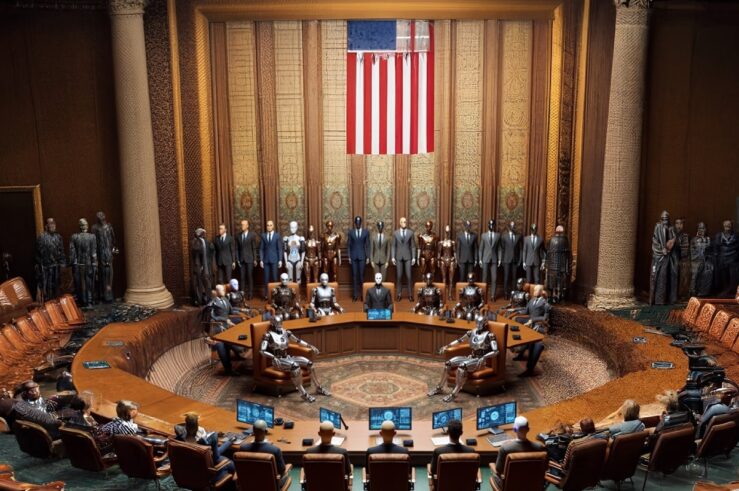Netflix’s latest net neutrality hypocrisy (yes, there have been others. See here and here, for example) involves its long-term, undisclosed throttling of its video traffic on AT&T’s and Verizon’s wireless networks, while it lobbied heavily for net neutrality rules from the FCC that would prevent just such throttling by ISPs.
It was Netflix that coined the term “strong net neutrality,” in an effort to import interconnection (the connections between ISPs and edge provider networks) into the net neutrality fold. That alone was a bastardization of what net neutrality purportedly stood for, as I previously noted:
There is a reason every iteration of the FCC’s net neutrality rules, including the latest, have explicitly not applied to backbone interconnection agreements: Interconnection over the backbone has always been open and competitive, and it simply doesn’t give rise to the kind of discrimination concerns net neutrality is meant to address.
That Netflix would prefer not to pay for delivery of its content isn’t surprising. But net neutrality regulations don’t — and shouldn’t — have anything to do with it.
But Netflix did something else with “strong net neutrality.” It tied it to consumer choice:
This weak net neutrality isn’t enough to protect an open, competitive Internet; a stronger form of net neutrality is required. Strong net neutrality additionally prevents ISPs from charging a toll for interconnection to services like Netflix, YouTube, or Skype, or intermediaries such as Cogent, Akamai or Level 3, to deliver the services and data requested by ISP residential subscribers. Instead, they must provide sufficient access to their network without charge. (Emphasis added).
A focus on consumers is laudable, of course, but when the focus is on consumers there’s no reason to differentiate between ISPs (to whom net neutrality rules apply) and content providers entering into contracts with ISPs to deliver their content (to whom net neutrality rules don’t apply).
And Netflix has just showed us exactly why that’s the case.
Netflix can and does engage in management of its streams in order (presumably) to optimize consumer experience as users move between networks, devices and viewers (e.g., native apps vs Internet browser windows) with very different characteristics and limitations. That’s all well and good. But as we noted in our Policy Comments in the FCC’s Open Internet Order proceeding,
In this circumstance, particularly when the content in question is Netflix, with 30% of network traffic, both the network’s and the content provider’s transmission decisions may be determinative of network quality, as may the users’ device and application choices.
As a 2011 paper by a group of network engineers studying the network characteristics of video streaming data from Netflix and YouTube noted:
This is a concern as it means that a sudden change of application or container in a large population might have a significant impact on the network traffic. Considering the very fast changes in trends this is a real possibility, the most likely being a change from Flash to HTML5 along with an increase in the use of mobile devices…. [S]treaming videos at high resolutions can result in smoother aggregate traffic while at the same time linearly increase the aggregate data rate due to video streaming.
Again, a concern with consumers is admirable, but Netflix isn’t concerned with consumers. It’s concerned at most with consumers of Netflix, while they are consuming Netflix. But the reality is that Netflix’s content management decisions can adversely affect consumers overall, including its own subscribers when they aren’t watching Netflix.
And here’s the huge irony. The FCC’s net neutrality rules are tailor-made to guarantee that Netflix will never have any incentive to take these externalities into account in its own decisions. What’s more, they ensure that ISPs are severely hamstrung in managing their networks for the benefit of all consumers, not least because their interconnection deals with large content providers like Netflix are now being closely scrutinized.
It’s great that Netflix thinks it should manage its video delivery to optimize viewing under different network conditions. But net neutrality rules ensure that Netflix bears no cost for overwhelming the network in the process. Essentially, short of building new capacity — at great expense to all ISP subscribers, of course — ISPs can’t do much about it, either, under the rules. And, of course, the rules also make it impossible for ISPs to negotiate for financial help from Netflix (or its heaviest users) in paying for those upgrades.
On top of this, net neutrality advocates have taken aim at usage-based billing and other pricing practices that would help with the problem by enabling ISPs to charge their heaviest users more in order to alleviate the inherent subsidy by normal users that flat-rate billing entails. (Netflix itself, as one of the articles linked above discusses at length, is hypocritically inconsistent on this score).
As we also noted in our OIO Policy Comments:
The idea that consumers and competition generally are better off when content providers face no incentive to take account of congestion externalities in their pricing (or when users have no incentive to take account of their own usage) runs counter to basic economic logic and is unsupported by the evidence. In fact, contrary to such claims, usage-based pricing, congestion pricing and sponsored content, among other nonlinear pricing models, would, in many circumstances, further incentivize networks to expand capacity (not create artificial scarcity).
Some concern for consumers. Under Netflix’s approach consumers get it coming and going: Either their non-Netflix traffic is compromised for the sake of Netflix’s traffic, or they have to pay higher subscription fees to ISPs for the privilege of accommodating Netflix’s ever-expanding traffic loads (4K videos, anyone?) — whether they ever use Netflix or not.
Sometimes, apparently, Netflix throttles its own traffic in order to “help” a few consumers. (That it does so without disclosing the practice is pretty galling, especially given the enhanced transparency rules in the Open Internet Order — something Netflix also advocated for, and which also apply only to ISPs and not to content providers). But its self-aggrandizing advocacy for the FCC’s latest net neutrality rules reveals that its first priority is to screw over consumers, so long as it can shift the blame and the cost to others.




